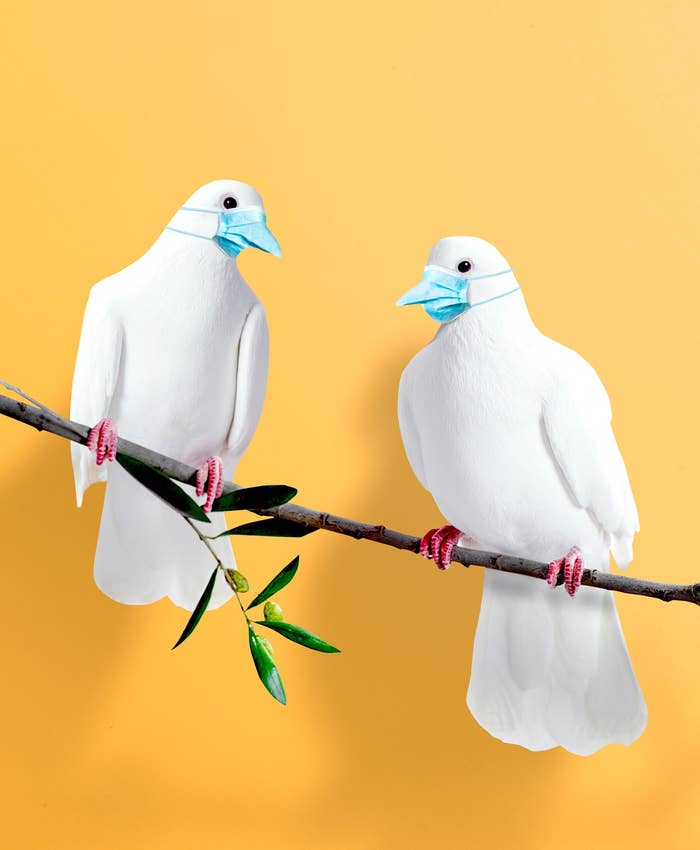
The journalists at BuzzFeed News are proud to bring you trustworthy and relevant reporting about the coronavirus. To help keep this news free, become a member and sign up for our newsletter, Outbreak Today.
“There's something about feeling like the world is going to end that makes you fearless to becoming vulnerable,” said Stephanie, a 31-year-old woman in California. She had been estranged from a once-close friend of nearly a decade for the past two years. The two had grown apart because of life changes, Stephanie said, but as the coronavirus pandemic made its way around the world and “things were starting to get scary,” she decided to reach out — because she “never stopped caring about him.” And that experience of vulnerability was eye-opening, she said. “I guess this is how we should all live in the first place.”
The pandemic has sparked a perspective shift for many, and it’s easy to understand why. Over 2 million people around the world have contracted COVID-19, and more than 100,000 have died from it. The virus and the isolation required to slow its spread have fundamentally changed our social lives, the way we celebrate, and how we’re able to mourn. And those ways in which the virus has upended life have prompted many people to reflect on past relationships and find new compassion and empathy for people they were once close to — even if they were the ones who got hurt.
Dozens of BuzzFeed News readers responded to a request for stories of fractured relationships with friends, family, and former partners that they’ve recently revisited. Some have found the pandemic to be clarifying as far as which relationships they feel are worthwhile — and which they can leave behind. Darrian, 29, a reader based in San Diego, hadn’t spoken to his former best friend of seven years in months when he received a text from the friend in early April, asking if he was okay. As of right now, Darrian said, “I haven't been able to bring myself to reply, and probably won't.” Based on the friend’s message and the past five months apart, Darrian is “pretty much convinced that I'm better off without him.” But he still has mixed feelings. “Sometimes I miss my best friend.”
Others are taking this opportunity to put it all out on the table. The uncertainty of the moment has emboldened people to lean into sincerity and confess their crushes. And of course, people have reached out to their exes, possibly in an attempt to revert to something that once made them feel safe.
“I guess this is how we should all live in the first place.”
For some, completely rebuilding a relationship that long since ran its course isn’t necessarily the end goal. When Stephanie reached out to her former friend, she wanted to make it clear there was no lingering bad blood. The last time the two spoke, Stephanie said she had expressed “nothing but hate towards this person.” Her friend had actually reached out to her last year to apologize for what went down between them, and she had brushed him off, but things were different this time. “This time around we were able to be honest and open.” Stephanie’s decision to bury the hatchet didn’t stem from a desire to inject herself back into her friend’s life, but simply to show that she still cared for him. “I think we both understand that we aren't meant to be in each other's lives. We care about each other from a (long) distance. It's kinda poetic.”
Some people may land somewhere in between. Amani, a 26-year-old living in Minnesota, reached out to a friend and former roommate she’s known for nine years. The two hadn’t spoken in two years when Amani texted. “This pandemic has given us so much time to take inventory of what’s important and what situations we wish we had handled differently,” she said, adding that the relationship soured after “years of living together, we started to pick at each other. It passed over from friendly banter to actual jabs.” Amani said the conversation was productive and “exactly what I hoped it would be. We talked about our lives and she left it knowing that I still care for her well-being.”
“Our relationship won’t be the same, but it doesn’t have to be,” she said. “I think it will survive.”
For some, picking up the pieces has been prompted by the overwhelming loneliness of being in self-isolation. Gabriela, 19, who lives in Ecuador, reached out to a friend she hadn’t spoken to in six months; she chalked up the friction that ultimately led to the friendship’s demise to “drama and misunderstandings in our friendship group.”
“I was having a panic attack one night and I felt so lonely. I missed him so much because he was the only one that could ever understand me,” Gabriela said. She ended up throwing caution to the wind and messaging him on Instagram, and then immediately regretted it, which made her unsend the messages on the app. Gabriela’s friend reached out to her the next day, after having seen the notifications for the now-phantom messages. “That’s when we started a real and proper conversation for the first time in months,” she said. The conversation between the two was productive, and Gabriela feels hopeful the reconnection will thrive post-pandemic.
“If you’d asked me before quarantine, I would’ve told you there was no hope,” she said. “But now looking forward to the day we get to spend time together and go back to what we missed keeps me going every day through this nightmare.”
“If you’d asked me before quarantine, I would’ve told you there was no hope.”
The process of reconciliation can be nerve-wracking when you’re waiting, and hoping, to see whether the person you hurt accepts your attempt to make peace. December, 31, who lives in Florida, had played a bit of a waiting game. Her marriage to her husband of six years, whom she’d known for a total of 13 years, had ended after infidelity on her part, she said. Since then, the only communication she’d had with her former partner was through texts sent back and forth because they share caretaking responsibilities for their dogs. The forced isolation of the ongoing pandemic has given December time “to think, process and reflect on life these last few months,” which is why she decided to send her husband a written letter in the mail. December told me that her husband responded to the letter and thanked her for reaching out. He said he still cared about her but thought they should face that they weren’t compatible, and hoped she would “make good choices” and be safe in the future.
“It was a rocky road to this and even though he had a little burn in there I am happy with his response,” December said.
Sometimes it takes a life-altering crisis for people to realize how much they actually need and enjoy one another’s company. Monica, a 30-year-old woman in California, said she had experienced a series of devastating blows to her relationship at the end of last year. There was an “unexpected abortion” right after Thanksgiving, and after returning from a trip to New Jersey to visit her boyfriend’s family over Christmas, they broke up right before New Year’s Eve. “Things just got really sad very quickly,” she said.
But the global crisis of the coronavirus pushed the two back into each other’s orbits. “We realized we were stronger together than separated during a time like this,” Monica said. The two live near one another, and since lockdown began, they’ve been staying together and have rekindled their relationship. Monica told me that she and her partner came to the conclusion that “the hiccups we endured weren't the issue, it was the way we were handling them.” They’ve now replaced those habits with healthier approaches, she said, like recognizing that they aren’t “mind readers” and that “we need to verbalize our thoughts and needs, without making assumptions about how the other person is feeling.”
Once the coronavirus lockdown began, “Suddenly we were making dinner every night, playing board games, painting canvases and complimenting each other on how well we were getting along versus when we were in an ‘official’ relationship,” she said. “He’s originally from New Jersey and I wanted to make it clear that he wasn’t alone out here and that no matter where we stand romantically, he’s my family and I am his.” Monica said she and her ex are avoiding labels and are not completely, officially back together, but she’s hopeful for the future. “We are best friends before all else,” she said. “If we cannot continue growing together as a couple, we will respect each other enough to end it amicably and peacefully, fully aware that we gave it our best shot.”
Sometimes it takes a life-altering crisis for people to realize how much they actually need and enjoy one another’s company.
For a lot of people, the relationships that are the most fraught, and the hardest to completely divest from, are familial bonds. “I felt it was necessary to get back in touch since we truly have no idea what could happen tomorrow,” said Danielle, a 30-year-old living in San Francisco, who picked up the phone and called her father, with whom she has always had a strained relationship. “Being quarantined gives you a lot of time to think and reconsider,” she said. Similarly, Sammy, a 29-year-old based in New York, had not spoken to her father in years, citing her stepmother as the person who drove a wedge between the two. Recently, she found her dad’s address and wrote a letter. “I honestly don’t know if I’ll ever hear from him, which doesn’t feel great,” she told me. “But honestly, I’m not ready to give up. I’ll keep writing to him once a month until he responds. It’s all I can do at this point.”
Rebecca, 31, who lives in Canada, said her relationship with her mother when she was growing up was often “emotionally and physically abusive.” Over the years, she said, there were several attempts made to reconnect with her mom, but “things never changed on her part.” And in 2014, after Rebecca married her now-ex-husband, she decided it was “best for everyone if we didn’t communicate any longer.”
Rebecca lost her job because of the pandemic and has also been dealing with the “very sudden and unexpected” end of her five-year-long marriage because of her husband’s adultery. Rebecca said she was terrified she wouldn’t be able to support herself and that she would end up homeless. The only person she had remained in contact with from her family was her older sister, who had often acted as a liaison between her and her mother. So Rebecca reached out to her sister to talk about her recent troubles, and unexpectedly, it led to her mother getting back in touch.
Two years ago, Rebecca’s mother had inherited a large sum of money from a relative. Though her mother had offered some of the money to Rebecca at the time, she had refused to take it. “I knew from experience that anything my mother gave me came with an unlisted price,” she said, “one I was not interested in paying anymore.” But recently Rebecca’s mother, after talking with her sister, reached out to Rebecca via email and said she would pay her rent and other expenses until she could get back on her feet.
Rebecca and her mom have now been consistently in communication over email while self-isolating. Rebecca said she’s “still guarded because of everything that’s happened between us, but it feels like things are getting better.” While it’s impossible to know what the world will look like after being reshaped by the coronavirus, Rebecca said as far as she and her mother are concerned, “I’m cautiously optimistic about our potential recovery.” ●
